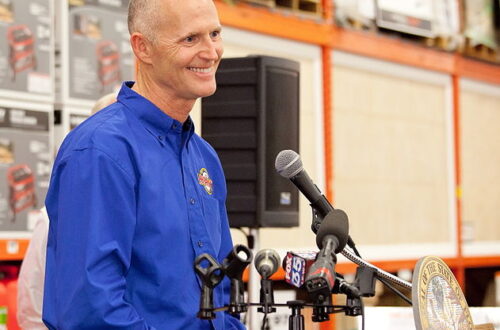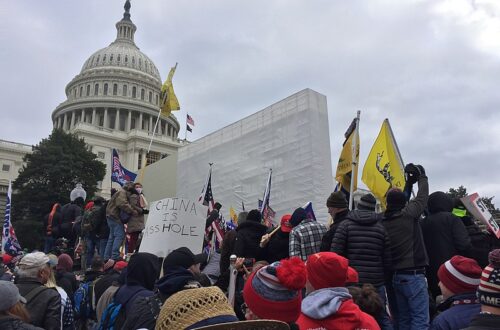Earlier this year, Gov. Ron DeSantis appointed Renatha Francis to the Florida Supreme Court for the second time; however, this time, Francis successfully took her seat on the court on Sept. 1.
In 2020, Francis didn’t meet the minimum Florida constitutional requirement for DeSantis’s appointment to Florida’s high court. Francis now meets the requirement of being a member of the Florida Bar for 10 years.
Why is DeSantis appointing Francis?
After Justice Alan Lawson retired at the end of August, DeSantis appointed Francis over six other applicants.
Lawson served six years as a Florida Supreme Court Justice after 15 years of experience including as a circuit judge in Orange and Osceola counties, a judge on the Fifth District Court of Appeal and one term as chief judge. After serving 35 years in the legal field, Lawson chose to retire, prioritizing health, family and community, he said.
Francis is replacing Lawson with six years of experience as an attorney, two years serving as a judge in Miami-Dade County and a judge on the 15th Circuit for about three years. Francis has almost 12 years of experience in the field.
Before working in the legal field, Francis, a Jamaican immigrant, was a full-time student and a small business owner. She also fulfilled the role of primary caregiver to her younger sibling. Francis earned her Juris Doctorate from Florida Coastal Law School.
Until 1974, Florida voters chose Florida Supreme Court justices rather than the governor. After a series of reforms, it was decided that the governor fills the court vacancies and selects one out of up to six qualified Florida judges recommended by the Judicial Nominating Commission.
At the end of the term, Floridians now vote on whether to retain the Justice.
First appointment attempt
When DeSantis attempted to appoint Francis initially in 2020, state Rep. Geraldine Thompson sued to deny Francis’s nomination to the high court as she was four months away from meeting the constitutional requirements.
The court unanimously concluded that DeSantis violated the Florida Constitution and exceeded his authority as governor by selecting Francis.
On Aug. 5, DeSantis commented, “It was all politics. There wasn’t anything that was based in principle.”
Although DeSantis stated that blocking Francis’s nomination was not based on principle, the 10-year Florida Bar member requirement is undisputedly written in the Florida State Constitution as one of two requirements for Florida’s highest court.
The Federalist Society
Ironically, DeSantis usually supports a strict, as-written interpretation of the Constitution. DeSantis appears to support a more flexible interpretation of the Constitution when his evident abuse of power is under examination.
Francis is a member of the Federalist Society, similarly supporting a strict interpretation of the Constitution. DeSantis was influenced by the help of the Federalist Society when selecting a Supreme Court nominee, often drawing on the organization’s ideas.
The Federalist Society is a legal group composed of conservatives and libertarians that is supposedly committed to a strict interpretation of the Constitution and a separation of government powers between the three branches.
Four justices on the U.S. Supreme Court are members of the Federalist Society: Kavanaugh, Gorsuch, Alito and Thomas.
Nearly 90% of Trump’s appellate judges were members of the Federalist Society, as noted by Sen. Sheldon Whitehouse.
DeSantis’ motives
At this time, DeSantis has appointed four out of seven sitting Florida Supreme Court justices.
In an interview, DeSantis stated, “But certainly the court has more of an impact than the Congress, day in and day out, even accepting only 80 cases a year.”
DeSantis understands the role and weight of the judiciary in determining laws for the state. Francis, who is 45, could leave a conservative influence in Florida’s court for the next 30 years.
DeSantis appears to push for Francis in an attempt to politicize the court, pursue his political agenda and preserve his image.
In a comment by Thompson about the latest appointment, Thompson stated, “To do anything other than appoint Francis would be to admit that he made a mistake the first time.”
Acknowledging his mistakes would reflect poorly on DeSantis’s image within his support base as he contends for the presidency.
Despite Florida’s high court reaffirming the right to abortion countless times, DeSantis’s new conservative court could undo progress in reproductive and human rights.
The court hears high public interest cases such as the abortion case, Planned Parenthood v. the State of Florida, and Hector Roos v. Ron DeSantis, Governor, which questions DeSantis’s authority to carry out an immigration program.
State Supreme Courts are, in theory, politically neutral. Since Florida Supreme Court Justices have the final say in state laws, unless appealed to the U.S. Supreme Court, the state courts play a significant role in citizens’ lives.
From abortion laws, immigration programs, education funding and voting to other controversial issues, state courts hold a majority of power in determining these laws within their state.
With the majority of justices appointed by DeSantis and more high-profile cases coming up in the future, Floridians will feel the long-lasting impacts of DeSantis and his judicial appointments.
Featured image: The Florida Supreme Court in Tallahassee. (Unmodified photo by Ebyabe used under a Creative Commons license. https://bit.ly/37WKyBg)
Check out other recent articles from the Florida Political Review here.





